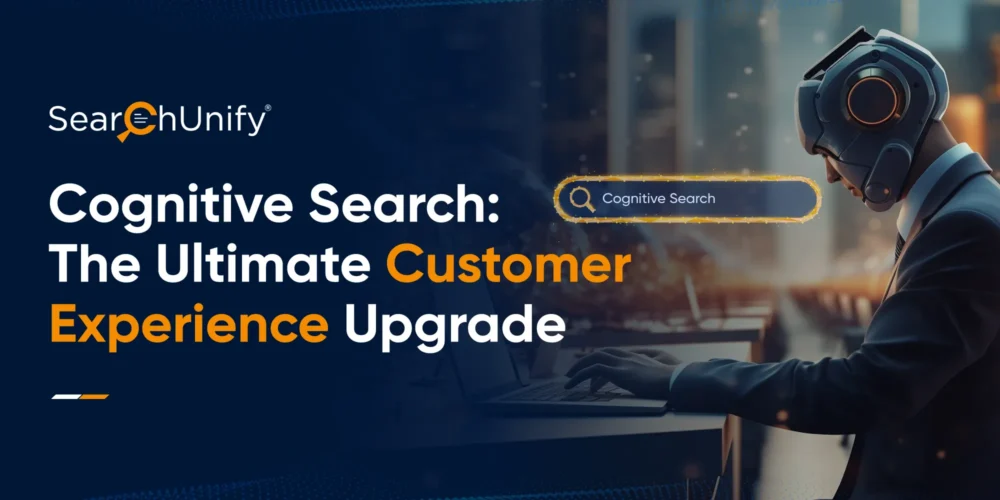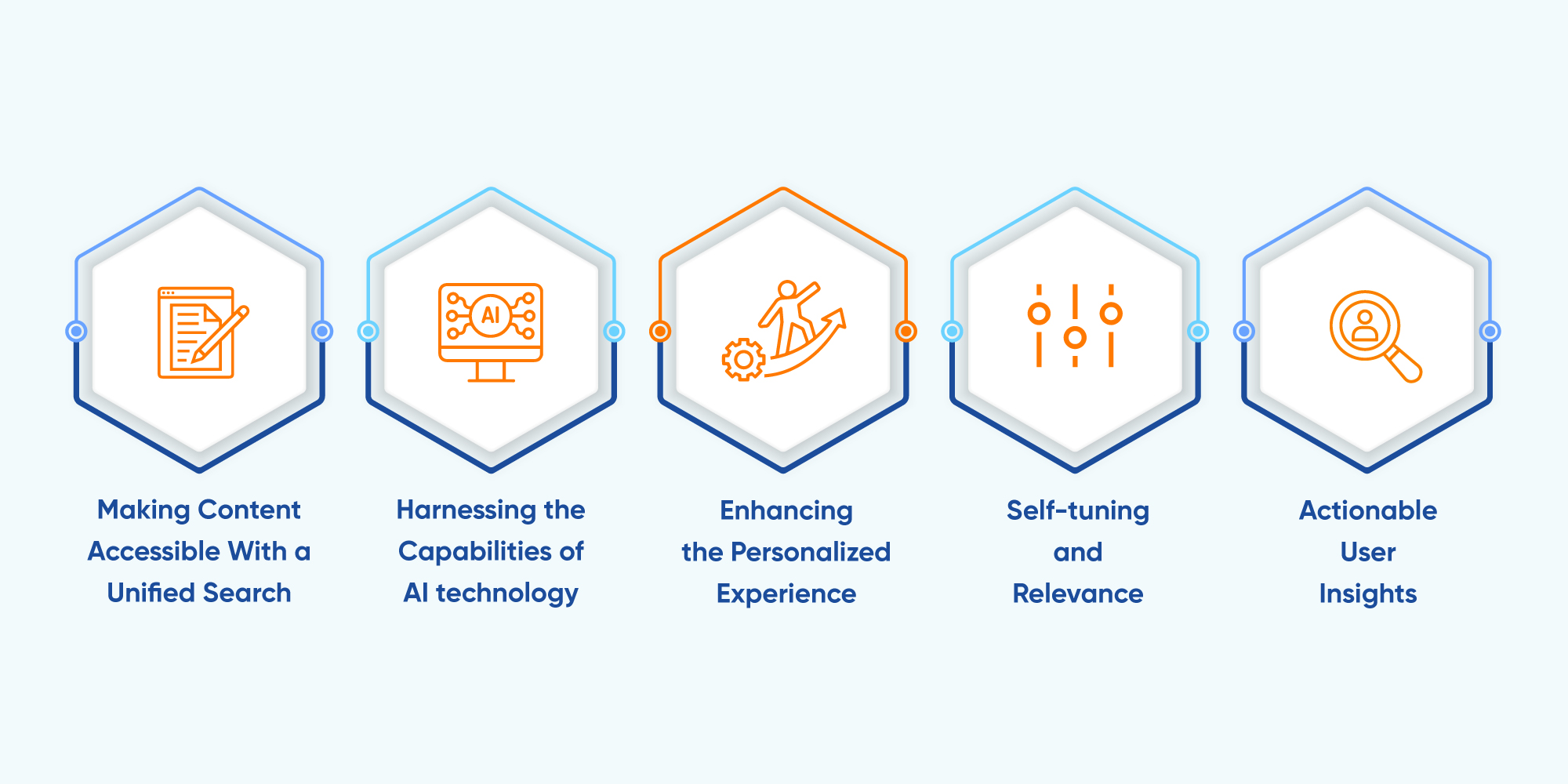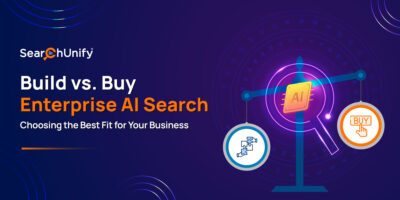
“This is not what I’m looking for.”
Many users go through the same experience even after leveraging enterprise search. Ever wondered why? As the digital landscape evolves, user demand changes. They crave a seamless search experience that is not just personalized, but delivers relevant and accurate results.
This is where cognitive search kicks in, taking your search experience to unprecedented levels.
Perhaps you’re thinking, “What is cognitive search, and why does my business need it?” To put it simply, cognitive search is the next-gen enterprise search technology that businesses require to transform its customer experience.
Curious to dive deeper into this buzzing technology? Look no further—this blog post explains how cognitive search offers an intuitive user experience and describes its use cases. So, let’s take a look at how we can get started!
How Does Cognitive Search Improve Customer Experience?
A good customer experience means happy customers who’ll sing praises of your brand. But did you know that after just one bad experience, 50% of your customers may shift to a competitor?
Fret not! Cognitive search will help you hit the nail on the head by precisely providing what your customers need.

Making Content Accessible With Unified Search
Cognitive search enables you to create a unified search index for the whole company’s knowledge scattered across various data repositories. Earlier, customers had to hop tabs to access the relevant information. But intelligent enterprise search has made it easy, saving time and effort.
It provides secure access to information in one place, empowering them to self-serve and solve their issues independently.
Harnessing the Capabilities of AI Technology
If you ask us why cognitive search is needed when a standard semantic search is already available, the answer lies in the power of artificial intelligence.
Cognitive search can leverage various AI technologies, such as natural language processing (NLP) and machine learning (ML).
NLP algorithms interpret the meaning behind users’ queries to identify their intent. They can also grasp context, and ML draws insight from unstructured and structured data sources to deliver more relevant and contextually correct results.
If customers get what they seek, it saves time and effort, leading to a fantastic customer experience.
Enhancing the Personalized Experience
How do your users feel when browsing the endless search results page? It can get frustrating, right?
However, this frustration can be avoided by leveraging cognitive search. By using filters and facets, users can ensure they get the most relevant results and personalize their search experience. It saves users from exasperating hurdles and empowers them to narrow their search with filters and populate only the most relevant results.
Self-tuning and Relevance
The more available data, the smarter your cognitive search can become by self-tuning. It leverages sophisticated ML algorithms to continuously learn and adjust itself to rank relevant and contextually accurate search results at the top.
The search engine considers the user’s interactions, behavioral analytics, and search history to ensure solution-oriented content exists, even if keywords don’t match.
Actionable User Insights
A lack of data-driven insights, causes self-service and support platforms to fail over time.
What if we couldn’t access user insights? How will you identify the gaps and areas for improvement? This is where cognitive search steps up as a game-changer.
It provides actionable insights that help to comprehend user behavior, intent, and hidden blind spots. This information empowers businesses to improve the customer experience and gain a competitive edge.
Different Use Cases of Cognitive Search
Cognitive search is transforming the way users retrieve information and additionally, offering a seamless user experience. Here are several use cases where this intelligent search unlocks various possibilities:
Customer Support
Empowering Self-service: A self-service portal without an efficient search solution is of no use. Customers would struggle to find a solution themselves, which would frustrate them.
However, by leveraging a cognitive search, they can self-serve, find solutions independently, and reduce the burden on support agents, leading to improved customer satisfaction and experience.
Faster Resolution: Gone are the days when support agents were stuck hopping tabs. Now, accurate and relevant information is just a click away, and enabling support agents to maximize their potential.
As a result, support agents resolve cases quickly, enhancing the customer experience and agent productivity.
Knowledge Management
Enhanced Information Retrieval: Cognitive search busts knowledge silos and improves information findability. This advanced search solution can retrieve content from multiple data sources and provide a unified search view to the users. It ensures that users have easy and quick access to the relevant knowledge they are looking for.
Insight and Analytics: In essence, cognitive search is about the insights and analytics that it provides about the knowledge base. It helps comprehend the most frequently searched information, search for successful conversions, and determines if there is any gap. It assists enterprises in making informed decisions about knowledge creation and other information governance strategies.
Marketing
Hyper-Personalized Results:Imagine a scenario where a retail fashion website harnesses the power of cognitive search to enhance its customers’ experience. A customer searches for “dresses for a party” in the search bar.
The advanced algorithms of cognitive search will analyze their search history, demographics, and purchasing behavior and show a collection of party dresses that match not only their color preference and size but also their fashion sense. It increases the chance of an exceptional customer experience.
Market Research: Data-driven insights are like treasure for marketers, helping them refine their marketing strategies. Cognitive search offers insights that enable marketers to identify hidden trends and patterns that traditional methods might miss.
Additionally, the customer search query analysis sheds light on what information customers are searching for and what they struggle to find. These insights act as a guide and help businesses optimize product descriptions and even develop new products or services that meet identified customers’ needs.
Conclusion
In the world of constantly evolving customer expectations, cognitive search has emerged as the beacon of hope for businesses that prioritize tailored customer experience. AI-powered search enhances search results relevance and accuracy and helps ensure customer satisfaction.
SearchUnify stands tall as a groundbreaker of AI-powered search and was recognized as a Leader in the G2 Grid® Report for Enterprise Search for the Seventeenth Consecutive Quarter.
So don’t just settle for “good customer experience.” It is time to take it to the next level with cognitive search.
To see how cognitive search can transform your customer experience, request a demo now!











